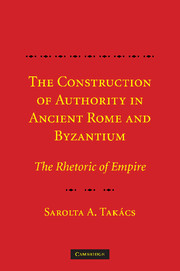Book contents
CHAPTER ONE - Republican Rome's Rhetorical Pattern of Political Authority
Published online by Cambridge University Press: 15 October 2009
Summary
Virtual Reality: To Win Fame and Practice Virtue
Rome, pagan or Christian, was a militaristic, patriarchal society. Virtuous behavior, the most noble form of which was self-sacrifice for the good of the state, generated honors. Glory was reaped in battle, and, in turn, produced other honors for the soldier as well as his family and his descendants. All of Rome's leading families claimed such exemplary, virtuous family members. Glory also bestowed remembrance. Words in the form of inscriptions, speeches, or poems, for example, and artistic representations were vehicles of this remembrance.
Because war and battle played such a prominent role in this definition of the self, military glory was at the core of the honors-remembrance-immortality system. Glory initiated and perpetuated the discourse. Each generation experienced the pressure at least to keep up with, if not to outperform, its ancestors. Death masks (imagines), displayed on the walls of homes, were visual reminders of forefathers. They were also periodically displayed in public, especially at a funeral of a family member. The second century BCE historian Polybius, a member of a prominent Greek family who came to Rome as a hostage after the battle of Pydna (168 BCE), writes:
On the occasion of public sacrifices, these masks are displayed and decorated with much care. When any distinguished member of the family dies, the masks are taken to the funeral and are worn by men who are considered most closely to resemble the original ancestor both in height and general bearing.…There could not easily be a more ennobling spectacle for a young man who aspires to win fame and practice virtue.[…]
- Type
- Chapter
- Information
- The Construction of Authority in Ancient Rome and ByzantiumThe Rhetoric of Empire, pp. 1 - 39Publisher: Cambridge University PressPrint publication year: 2008



